高三英语时态总结(十六大类)及其配套训练 导学案-2025届高三上学期英语二轮复习专项
文档属性
| 名称 | 高三英语时态总结(十六大类)及其配套训练 导学案-2025届高三上学期英语二轮复习专项 | 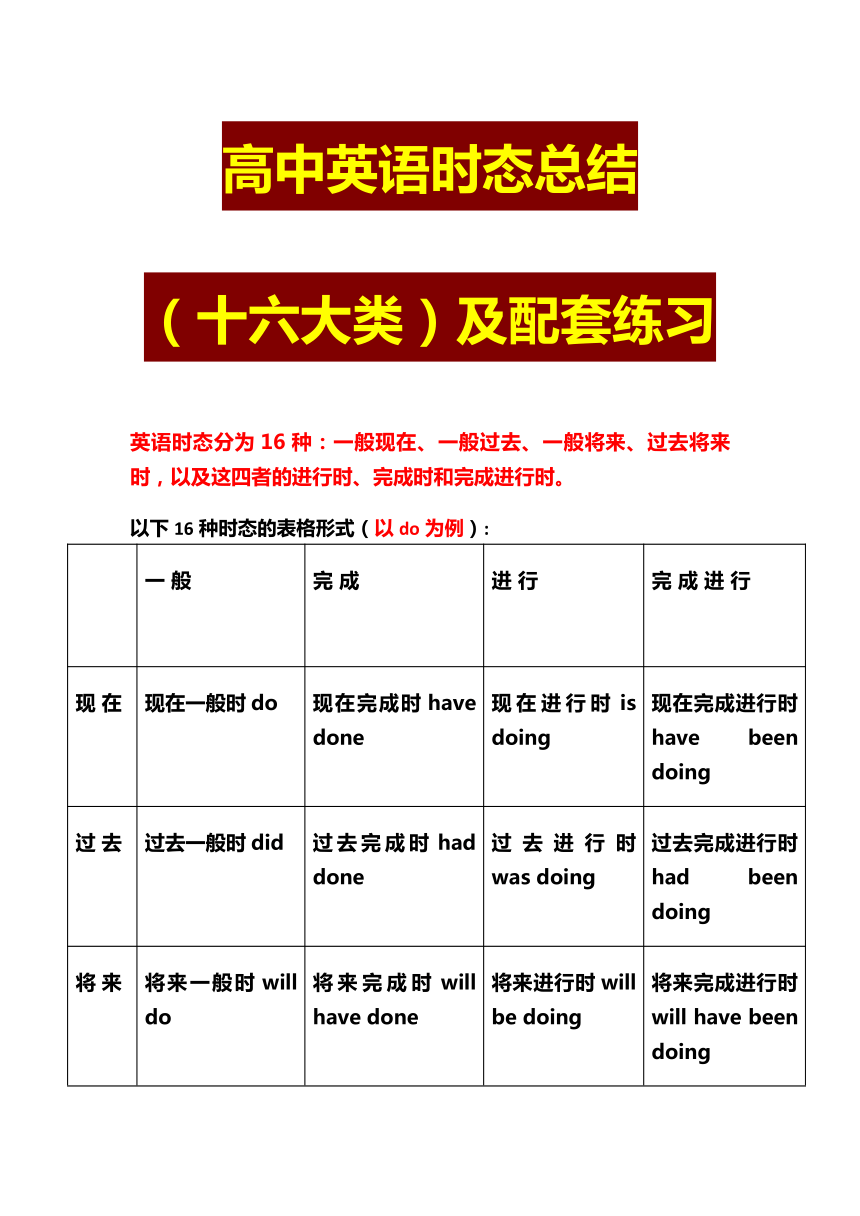 | |
| 格式 | docx | ||
| 文件大小 | 29.6KB | ||
| 资源类型 | 教案 | ||
| 版本资源 | 人教版(2019) | ||
| 科目 | 英语 | ||
| 更新时间 | 2025-01-06 15:32:14 | ||
图片预览

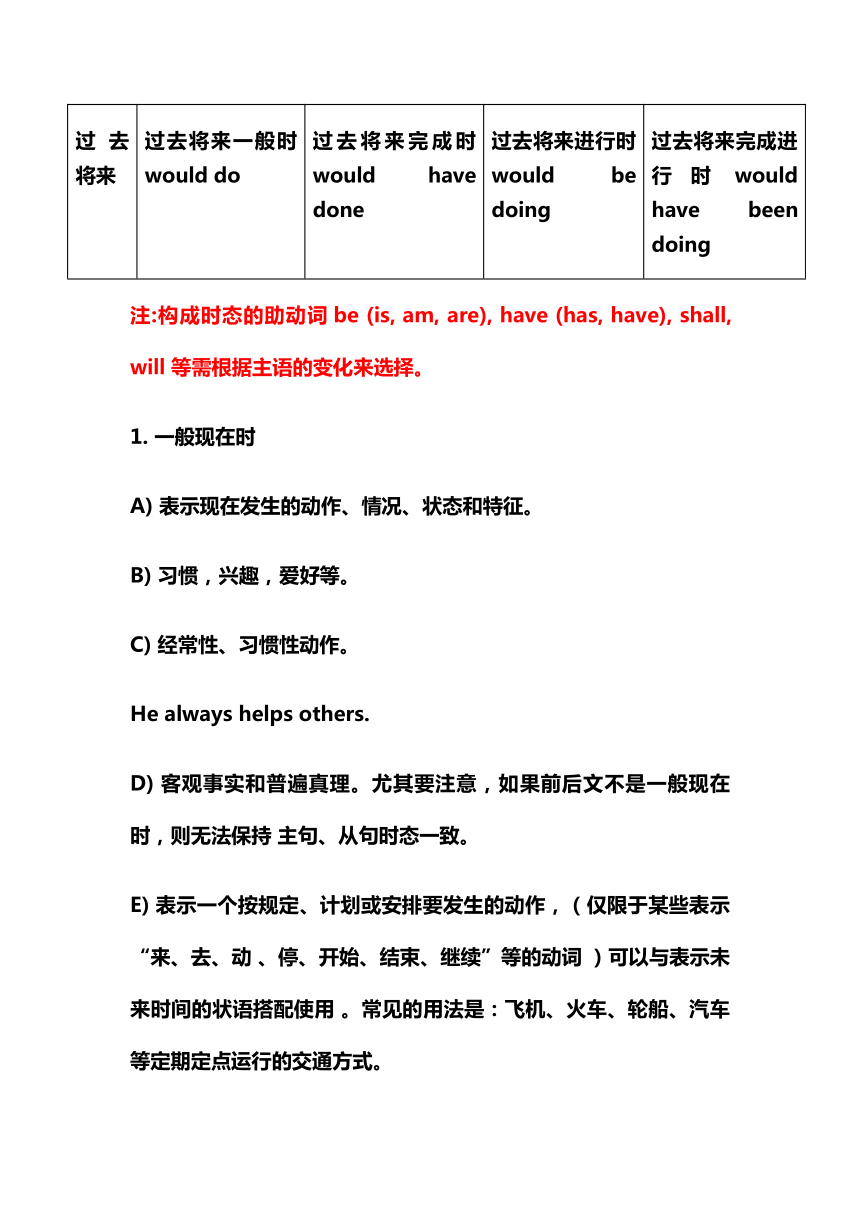
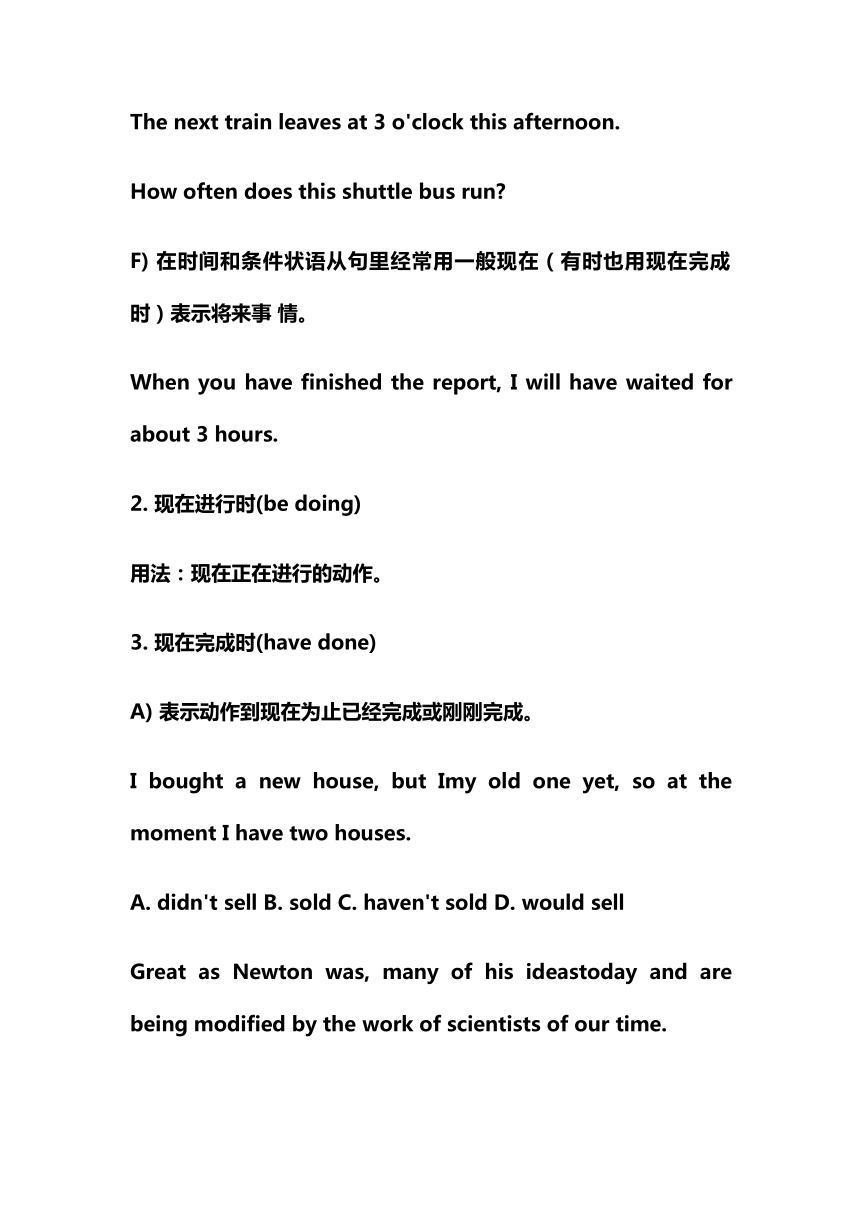
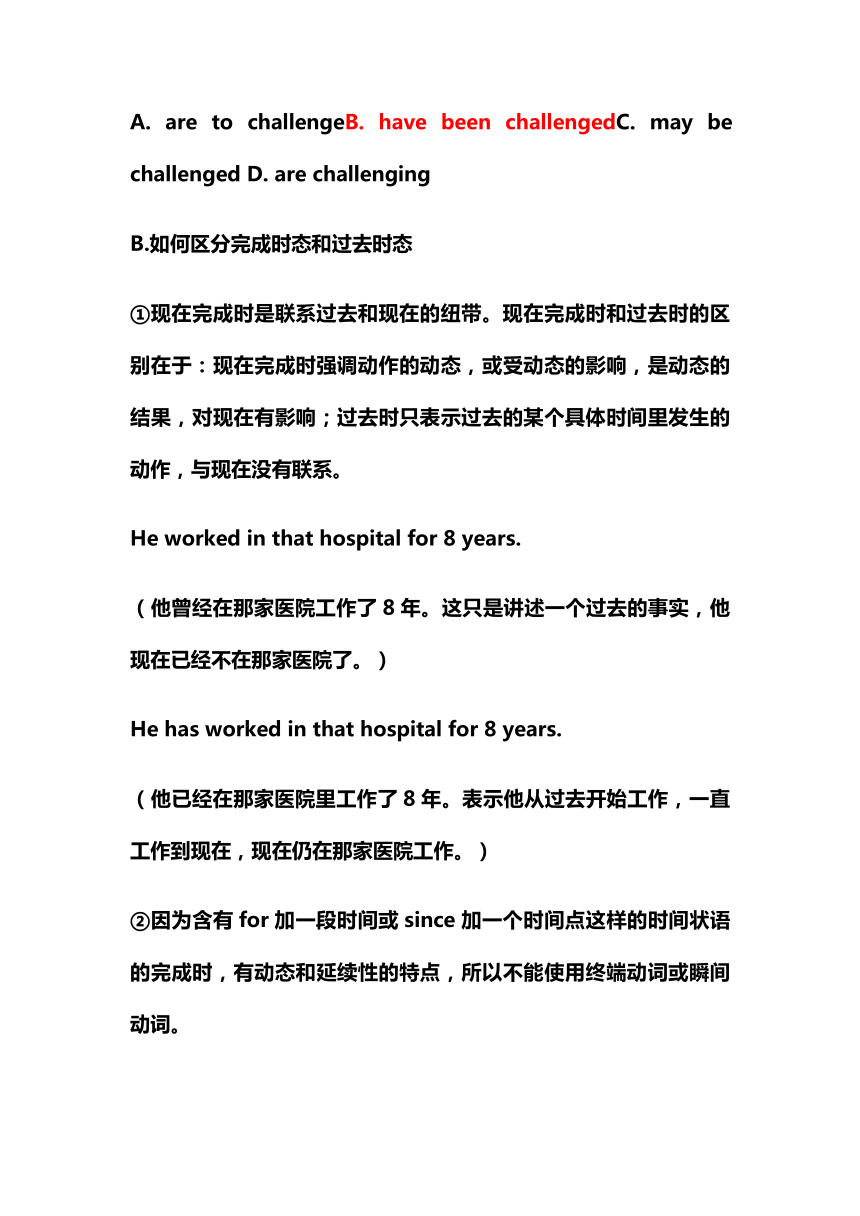
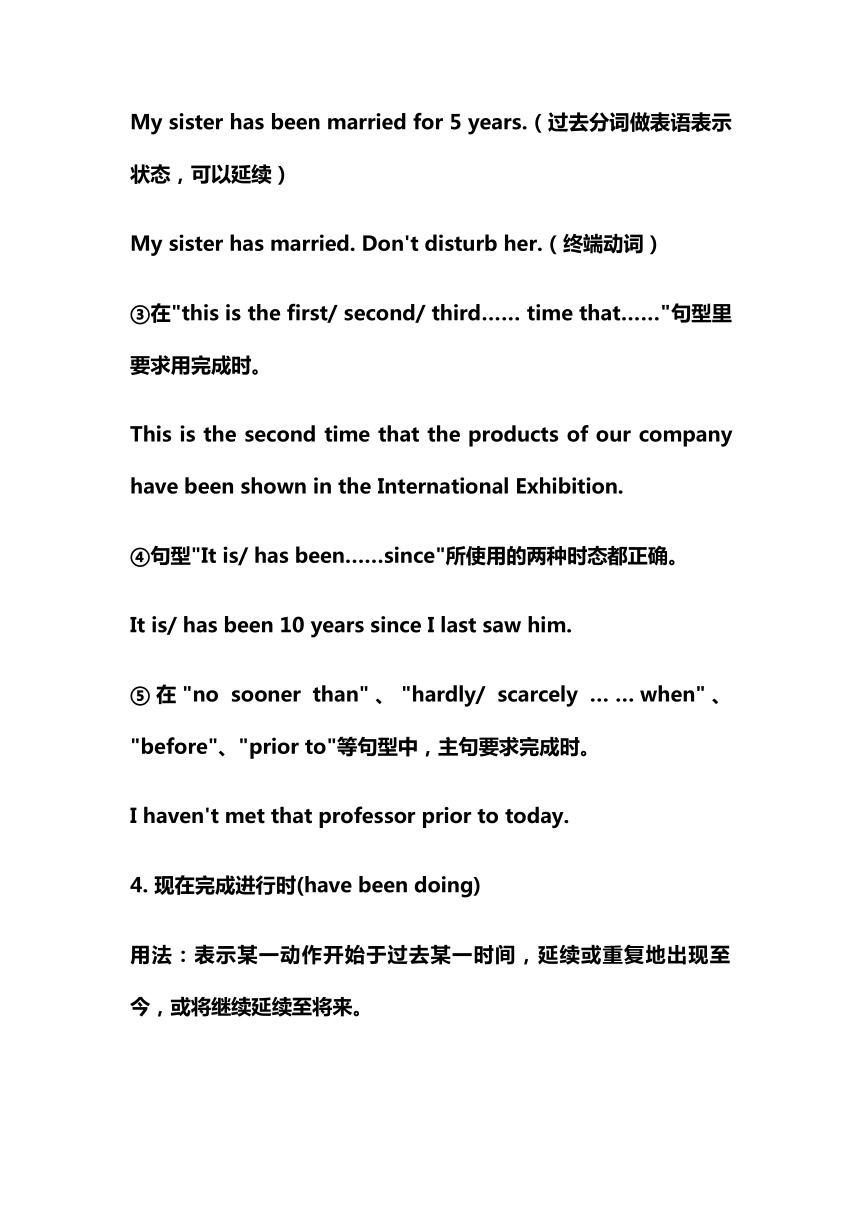
文档简介
高中英语时态总结
(十六大类)及配套练习
英语时态分为16种:一般现在、一般过去、一般将来、过去将来时,以及这四者的进行时、完成时和完成进行时。
以下16种时态的表格形式(以do为例):
一 般 完 成 进 行 完 成 进 行
现 在 现在一般时do 现在完成时have done 现在进行时is doing 现在完成进行时have been doing
过 去 过去一般时did 过去完成时had done 过去进行时was doing 过去完成进行时had been doing
将 来 将来一般时will do 将来完成时will have done 将来进行时will be doing 将来完成进行时will have been doing
过去将来 过去将来一般时would do 过去将来完成时would have done 过去将来进行时would be doing 过去将来完成进行时would have been doing
注:构成时态的助动词be (is, am, are), have (has, have), shall, will 等需根据主语的变化来选择。
1. 一般现在时
A) 表示现在发生的动作、情况、状态和特征。
B) 习惯,兴趣,爱好等。
C) 经常性、习惯性动作。
He always helps others.
D) 客观事实和普遍真理。尤其要注意,如果前后文不是一般现在时,则无法保持 主句、从句时态一致。
E) 表示一个按规定、计划或安排要发生的动作,(仅限于某些表示“来、去、动 、停、开始、结束、继续”等的动词 )可以与表示未来时间的状语搭配使用 。常见的用法是:飞机、火车、轮船、汽车等定期定点运行的交通方式。
The next train leaves at 3 o'clock this afternoon.
How often does this shuttle bus run
F) 在时间和条件状语从句里经常用一般现在(有时也用现在完成时)表示将来事 情。
When you have finished the report, I will have waited for about 3 hours.
2. 现在进行时(be doing)
用法:现在正在进行的动作。
3. 现在完成时(have done)
A) 表示动作到现在为止已经完成或刚刚完成。
I bought a new house, but Imy old one yet, so at the moment I have two houses.
A. didn't sell B. sold C. haven't sold D. would sell
Great as Newton was, many of his ideastoday and are being modified by the work of scientists of our time.
A. are to challengeB. have been challengedC. may be challenged D. are challenging
B.如何区分完成时态和过去时态
①现在完成时是联系过去和现在的纽带。现在完成时和过去时的区别在于:现在完成时强调动作的动态,或受动态的影响,是动态的结果,对现在有影响;过去时只表示过去的某个具体时间里发生的动作,与现在没有联系。
He worked in that hospital for 8 years.
(他曾经在那家医院工作了8年。这只是讲述一个过去的事实,他现在已经不在那家医院了。)
He has worked in that hospital for 8 years.
(他已经在那家医院里工作了8年。表示他从过去开始工作,一直工作到现在,现在仍在那家医院工作。)
②因为含有for加一段时间或since加一个时间点这样的时间状语的完成时,有动态和延续性的特点,所以不能使用终端动词或瞬间动词。
My sister has been married for 5 years.(过去分词做表语表示状态,可以延续)
My sister has married. Don't disturb her.(终端动词)
③在"this is the first/ second/ third…… time that……"句型里要求用完成时。
This is the second time that the products of our company have been shown in the International Exhibition.
④句型"It is/ has been……since"所使用的两种时态都正确。
It is/ has been 10 years since I last saw him.
⑤在"no sooner than"、"hardly/ scarcely ……when"、"before"、"prior to"等句型中,主句要求完成时。
I haven't met that professor prior to today.
4. 现在完成进行时(have been doing)
用法:表示某一动作开始于过去某一时间,延续或重复地出现至今,或将继续延续至将来。
We have been working on this project for over a month now.
*与现在完成时相比,现在完成进行时更强调:在从过去到现在的时间里,动作或状态一直持续或一直反复出现。
It seems oilfrom this pipe for some time. We'll have to take the machine apart to put it right.
A. had leaked B. is leaking C. leakedD. has been leaking
5. 一般过去时
A) 表示过去某个时间发生的动作或情况。
B) 表示过去习惯性动作。特别是由would/ used to do表达的句型,本身表示的 就是过去时。
The old man would sit on a bench in the quiet park and look at others for hours without doing anything or talking to anybody.
He used to visit his mother once a week.
C) 有时可代替一般现在时,表达一种婉转、客气、礼貌、商量的语气。
I wanted to ask you if I could borrow your car
Would you mind my sitting here
一些注意事项:
A) 注意时间状语的搭配。一般过去时的时间状语应该是表示过去某个时间的词或词组,如:yesterday, last month, in 1999, two days ago等,绝对不可与recently, in the past 10 years, this month等连用,因为这样的时间状语都与现在有关系,应该用现在完成时或一般现在时。
B) used to do的否定形式和疑问形式很特别:你怎么写都正确。以否定形式为例:used not to do, didn't used to do, didn't use to do都对。
Used to do经常与 be used to doing sth/ sth结构进行对比。前者表示"过去常常或过去曾经",要求加动词原形;后者表示"习惯于",要求加名词或动名词。
6. 过去完成时(had done)
用法:表示在过去的某个时间或动作以前已经发生的动作或已经存在的状态。就是我们常说的:表示"过去的过去"。
Until then, his familyfrom him for six months.
A. didn’t hear B. hasn't heard C. hasn't been hearingD. hadn't heard
注意事项:“过去的过去”这种逻辑关系常通过上下文体现出来,而不一定受某个时间状语的限制。
There had been someone in our room just now, because I noticed a burning cigarette end on the floor when we opened the front door.
7. 过去将来时(would/ should do)
表示从过去的某个时间看将要发生的事。
I said on Thursday I should see my friend the next day.
注意事项:由于过去将来时是由过去时和将来时组合而成的,所以其注意事项可以参考过去时和将来时的相关注意事项。
8. 过去进行时(was/ were doing)
A) 表示在过去一个比较具体的时间正在发生的动作。
Mary was listening to light music 10 minutes ago.
B) 如果when, while这样的时间状语引导词所引导的主从句之一是一般过去时,则另一个句子常用过去进行时。
I was washing my hair when you knocked at the front door.
9. 一般将来时
A) 基本结构是will / shall do。
We shall send her a glass hand-made craft as her birthday gift.
B) 有些动词,如:arrive, be close, come, do, done, go, have, leave, open, play, return, sleep, start, stay等,用于一般进行时,并且通常与一个表示将来时间的时间状语连用,可以表示将来时。
My mother is coming to visit me next week and is staying here until May.
C) 表示“打算去……,要……”时,可用be going to do。
This is just what I am going to say.
D) 表示“即将、正要”时,可用be about to do。强调近期内或马上要做的事。
Don't worry, I am about to make a close examination on you.
E) "be to do"的5种用法:
a) 表示“按计划、安排即将发生某事或打算做某事”。
She is to be seen in the lab on Monday.
b) 该做或不该做的事情(语气上接近should, must, ought to, have to),表示一种命令、规劝性语气。
You are to go to bed and keep quiet, kids. Our guests are arriving in less than 5 minutes.
c) 能或不能发生的事情(接近can, may)
How am I to pay such a debt
d) 不可避免将要发生的事情,后来将要发生的事情。
I assure you that the matteras quickly as possible. Have a little patience.
A. will be attendedB. will be attended toC. is attended D. is attended to
e) 用于条件从句“如果……想,设想”(接近if ……want to,或if ……should)
Greater efforts to increase agricultural production must be made if food shortageavoided.
A. is to beB. can be C. will be D. has been
f) 同样可以表示“正要、将要”的意思的句型是be on the point of doing。
The coach is on the point of giving up the game because our team has been scored 7 points. I wasthe point of telephoning him when his letter arrived.
A. in B. to C. at D. on
注意事项:
在以if, when, as long as, as soon as, after, before, in case, until, unless等连词以及具有连词作用的副词(immediately, the moment, directly)等引导的状语从句,一般用现在时代替将来时。强调延续性或动态时,可用完成时。
I hope his health will have improved by the time you come back next year.
10. 将来进行时(will be doing)
强调在将来的某个具体时间正在发生的动作或事情。
Don't worry, you won't miss her. She will be wearing a red T-shirt and a white skirt at that time.
11. 将来完成时(will have done)
表示从将来的某一时间开始、延续到另一个将来时间的动作或状态,或是发生在某个将来时间。就好象把现在完成时平移到时间轴的将来时时段一样。其用法从和过去及现在有关,变成了和将来及将来的将来有关。
The conferencea full week by the time it ends.
A. must have lasted B. will have lasted C. would last D. has lasted
12)将来完成进行时:shall have been doing ,will have been doing
By the end of next month, the project will have been being worked for 3 years.
13)过去完成进行时:had been doing
The old clock had been being taken apart of and fixed up again for several times by my 10-year old son before I came back home.
14) 过去将来进行时:should be doing , would be doing
The government promised that a new highway would be being built next July.
15) 过去将来完成时:Should have done, would have done
I believed by the end of that year an advanced version of that software would have been developed, but I was wrong.
16) 过去将来完成进行时:Should have been doing, would have been doing
They said that by the end of the following month, the project would have been being worked for 3 years.
时态配套练习题(标红的为正确答案)
1. --- Oh, dear. I forgot the air tickets.
--- You_______something.
A. have leftB. are always leavingC. are leaving D. always left
2. --- I_______so busily recently that I_______no time to help you with your math.
--- That’s OK. I can manage it by myself.
A. have been working;have B. have worked; had
C. am working; will have D. had been working; had had
3. Remember to send me a photo of us next time you_______to me.
A. are writing B. will write C. has writtenD. write
4. He_______at the meeting, but his heart attack prevented him.
A. will speak B. is going to speak C. had to speakD. was going to speak
5. --- I beg your pardon, but I didn’t quite catch you. --- Oh, I_______myself.
A. am talking to B. talked about C. have talked toD. was talking to
6. I_______ping-pong quite well, but I haven’t had time to play since the New Year.
A. will play B. have played C. playedD. play
7. I first met Tom 10 years ago. He_______in a radio factory at that time.
A. had worked B. has workedC. was workingD. has been working
8. --- What_______when I phoned you --- I_______my work, and I wanted to go out.
A. have you done; finished B. were you doing; have finished
C. did you do; had just finishedD. were you doing; had just finished
9. --- Have you finished the report --- No. I_______it all this week.
A. will do B. had done C. have doneD. have been doing
10. I can guess you were in a hurry. You_______your sweater inside out.
A. had worn B. wore C. were wearingD. are wearing
11. --- We_______that you would fix the TV set this week.
--- I’m sorry. I_______to fix it this week, but I’ve been too busy.
A. had expected; had intendedB. are expecting; had intended
C. expect; intend D. expected; intend
12. --- Why Tom, your shirt is so dirty!--- Mum, I_______my storeroom downstairs.
A. cleaned B. have cleaned C. was cleaningD. have been cleaning
13. They won’t buy new clothes because they_______money to buy a new house.
A. saveB. are savingC. have saved D. were saving
14. The traffic in our city is already good and it_______even better.
A. gets B. got C. has gotD. is getting
15. --- I will come to attend your lecture at 10:00 tomorrow.
--- I’m sorry, by then my lecture will have ended and I_______my guests in my office.
A. is being met B. will meetC. will be meetingD. will have met
16. --- Alice came back home the day before yesterday.--- Really Where_______
A. has she beenB. had she beenC. has she gone D. had she gone
17. I know Mr. Brown; we_______to each other at an international conference.
A. are introduced B. are been introducedC. were introducedD. had been introduced
18. Don’t bother to look for my dictionary --- it_______some day.
A. turns up B. has turned upC. will turn upD. is going to turn up
19. --- What do you think of this kind of TV set, which_______in Shanghai
--- Well, I don’t care about such things.
A. was madeB. is madeC. has been made D. had been made
20. --- Did he notice you enter the room
--- I don’t think so. He_______to the radio with his eyes shut.
A. listenedB. was listeningC. has listened D. had listened
21. The plan_______eat 7:00 pm, so I have to be at the airport by 6:40 at the latest.
A. has left B. would leave C. will have leftD. leaves
22. The train_______at the present speed until it reaches the foot of the mountain at about nine o’clock tonight.
A. went B. is going C. goesD. will be going
23. I used to drink a lot of tea but these days I_______coffee.
A. preferB. preferred C. had preferred D. am preferring
24. The vegetables didn’t taste very good. They_______too long.
A. had been cookedB. were cooked C. have cooked D. cooked
25. --- Remember the first time we met, Jim
--- Of course I do. You_______in the library.
A. were readingB. had read C. have read D. read
26. I want to buy that kind of cloth because It_______he cloth_______well.
A. have told; washesB. have been told; washes
C. was told; washed D. have been told; is washed
27. --- Is Tom still smoking
--- No. By next Saturday he_______for a whole month without smoking a single cigarette.
A. will beB. will have goneC. will have been D. has been going
28. ---_______Betty this morning
--- Not yet, but she is sure to be here before noon.
A. Have you seenB. Will you see C. Do you see D. Did you see
29. Jim talked for about half an hour yesterday. Never_______him talk so much.
A. I heard B. did I hear C. I had heardD. had I heard
30. --- Look at the black clouds. It_______soon.
--- Sure. If only we_______out.
A. is raining; didn’t come B. is to rain; won’t start
C. will rain; haven’t startedD. is going to rain; hadn’t come
31. He_______articles for our wall-newspaper these three years, and heabout forty articles.
A. has been writing; has writtenB. has been writing; wrote
C. is writing; has been writing D. has written; has written
32. Sh_______eto the office than she got down to writing the report.
A. has no sooner got B. had hardly gotC. no sooner gotD. had no sooner got
33. --- Don’t forget to bring my new books tomorrow afternoon. --- No, I._______
A. don’t B. doC. won’tD. will
34. I decided to go to the library as soon as I._______
A. finished what I was doingB. finished what I did
C. would finish what I was doing D. finish what I did
35. You won’t know whether the coat fits you until you_______it on.
A. will tryB. have triedC. tried D. are trying
36. --- How are you planning to travel to Shanghai
--- I_______yet, but I_______taking a train.
A. didn’t decide; am considering B. haven’t decided; consider
C. haven’t decided; am consideringD. hadn’t decided; have considered
37. --- Excuse me, sir. Would you do me a favor
--- Of course. What is it
--- I_______if you could take me to the station.
A. would wonder B. did wonderC. was wonderingD. had wondered
38. --- Got your driving license
--- No. I_______too busy to have enough practice, so I didn’t take the driving test last week. I’m going to next week.
A. was B. have been C. amD. had been
39. With the development of science, more new technology_______to the field of IT.
A. has introducedB. is being introducedC. is introduced D. was introduced
40. --- Who’s the man over there
--- It’s Jack.
--- Oh _______in Italy.
A. I think he’s B. I’ve thought he’s been
C. I thought he wasD. I’d thought he’d been
41. --- I dropped in at your house at about ten last night, but you weren’t in.
--- I_______regular exercises at the club.
A. didB. was doingC. had done D. have been doing
42. --- Each of the students, working hard at their lessons,_______the book.--- So have I.
A. is readingB. has readC. reading D. reads
43. It is when the plane_______that you’d better find out at the booking office.
A. would take off B. had taken off C. was taking offD. is taking off
44. --- I’m sorry, but there’s no smoking on this flight. --- Oh, I_______that. Sorry, I won’t again.
A. don’t knowB. didn’t knowC. won’t know D. haven’t known
45. I thought Jim would say something about his school report, but he_______it.
A. doesn’t mention B. hadn’t mentionedC. didn’t mentionD. hasn’t mentioned
(十六大类)及配套练习
英语时态分为16种:一般现在、一般过去、一般将来、过去将来时,以及这四者的进行时、完成时和完成进行时。
以下16种时态的表格形式(以do为例):
一 般 完 成 进 行 完 成 进 行
现 在 现在一般时do 现在完成时have done 现在进行时is doing 现在完成进行时have been doing
过 去 过去一般时did 过去完成时had done 过去进行时was doing 过去完成进行时had been doing
将 来 将来一般时will do 将来完成时will have done 将来进行时will be doing 将来完成进行时will have been doing
过去将来 过去将来一般时would do 过去将来完成时would have done 过去将来进行时would be doing 过去将来完成进行时would have been doing
注:构成时态的助动词be (is, am, are), have (has, have), shall, will 等需根据主语的变化来选择。
1. 一般现在时
A) 表示现在发生的动作、情况、状态和特征。
B) 习惯,兴趣,爱好等。
C) 经常性、习惯性动作。
He always helps others.
D) 客观事实和普遍真理。尤其要注意,如果前后文不是一般现在时,则无法保持 主句、从句时态一致。
E) 表示一个按规定、计划或安排要发生的动作,(仅限于某些表示“来、去、动 、停、开始、结束、继续”等的动词 )可以与表示未来时间的状语搭配使用 。常见的用法是:飞机、火车、轮船、汽车等定期定点运行的交通方式。
The next train leaves at 3 o'clock this afternoon.
How often does this shuttle bus run
F) 在时间和条件状语从句里经常用一般现在(有时也用现在完成时)表示将来事 情。
When you have finished the report, I will have waited for about 3 hours.
2. 现在进行时(be doing)
用法:现在正在进行的动作。
3. 现在完成时(have done)
A) 表示动作到现在为止已经完成或刚刚完成。
I bought a new house, but Imy old one yet, so at the moment I have two houses.
A. didn't sell B. sold C. haven't sold D. would sell
Great as Newton was, many of his ideastoday and are being modified by the work of scientists of our time.
A. are to challengeB. have been challengedC. may be challenged D. are challenging
B.如何区分完成时态和过去时态
①现在完成时是联系过去和现在的纽带。现在完成时和过去时的区别在于:现在完成时强调动作的动态,或受动态的影响,是动态的结果,对现在有影响;过去时只表示过去的某个具体时间里发生的动作,与现在没有联系。
He worked in that hospital for 8 years.
(他曾经在那家医院工作了8年。这只是讲述一个过去的事实,他现在已经不在那家医院了。)
He has worked in that hospital for 8 years.
(他已经在那家医院里工作了8年。表示他从过去开始工作,一直工作到现在,现在仍在那家医院工作。)
②因为含有for加一段时间或since加一个时间点这样的时间状语的完成时,有动态和延续性的特点,所以不能使用终端动词或瞬间动词。
My sister has been married for 5 years.(过去分词做表语表示状态,可以延续)
My sister has married. Don't disturb her.(终端动词)
③在"this is the first/ second/ third…… time that……"句型里要求用完成时。
This is the second time that the products of our company have been shown in the International Exhibition.
④句型"It is/ has been……since"所使用的两种时态都正确。
It is/ has been 10 years since I last saw him.
⑤在"no sooner than"、"hardly/ scarcely ……when"、"before"、"prior to"等句型中,主句要求完成时。
I haven't met that professor prior to today.
4. 现在完成进行时(have been doing)
用法:表示某一动作开始于过去某一时间,延续或重复地出现至今,或将继续延续至将来。
We have been working on this project for over a month now.
*与现在完成时相比,现在完成进行时更强调:在从过去到现在的时间里,动作或状态一直持续或一直反复出现。
It seems oilfrom this pipe for some time. We'll have to take the machine apart to put it right.
A. had leaked B. is leaking C. leakedD. has been leaking
5. 一般过去时
A) 表示过去某个时间发生的动作或情况。
B) 表示过去习惯性动作。特别是由would/ used to do表达的句型,本身表示的 就是过去时。
The old man would sit on a bench in the quiet park and look at others for hours without doing anything or talking to anybody.
He used to visit his mother once a week.
C) 有时可代替一般现在时,表达一种婉转、客气、礼貌、商量的语气。
I wanted to ask you if I could borrow your car
Would you mind my sitting here
一些注意事项:
A) 注意时间状语的搭配。一般过去时的时间状语应该是表示过去某个时间的词或词组,如:yesterday, last month, in 1999, two days ago等,绝对不可与recently, in the past 10 years, this month等连用,因为这样的时间状语都与现在有关系,应该用现在完成时或一般现在时。
B) used to do的否定形式和疑问形式很特别:你怎么写都正确。以否定形式为例:used not to do, didn't used to do, didn't use to do都对。
Used to do经常与 be used to doing sth/ sth结构进行对比。前者表示"过去常常或过去曾经",要求加动词原形;后者表示"习惯于",要求加名词或动名词。
6. 过去完成时(had done)
用法:表示在过去的某个时间或动作以前已经发生的动作或已经存在的状态。就是我们常说的:表示"过去的过去"。
Until then, his familyfrom him for six months.
A. didn’t hear B. hasn't heard C. hasn't been hearingD. hadn't heard
注意事项:“过去的过去”这种逻辑关系常通过上下文体现出来,而不一定受某个时间状语的限制。
There had been someone in our room just now, because I noticed a burning cigarette end on the floor when we opened the front door.
7. 过去将来时(would/ should do)
表示从过去的某个时间看将要发生的事。
I said on Thursday I should see my friend the next day.
注意事项:由于过去将来时是由过去时和将来时组合而成的,所以其注意事项可以参考过去时和将来时的相关注意事项。
8. 过去进行时(was/ were doing)
A) 表示在过去一个比较具体的时间正在发生的动作。
Mary was listening to light music 10 minutes ago.
B) 如果when, while这样的时间状语引导词所引导的主从句之一是一般过去时,则另一个句子常用过去进行时。
I was washing my hair when you knocked at the front door.
9. 一般将来时
A) 基本结构是will / shall do。
We shall send her a glass hand-made craft as her birthday gift.
B) 有些动词,如:arrive, be close, come, do, done, go, have, leave, open, play, return, sleep, start, stay等,用于一般进行时,并且通常与一个表示将来时间的时间状语连用,可以表示将来时。
My mother is coming to visit me next week and is staying here until May.
C) 表示“打算去……,要……”时,可用be going to do。
This is just what I am going to say.
D) 表示“即将、正要”时,可用be about to do。强调近期内或马上要做的事。
Don't worry, I am about to make a close examination on you.
E) "be to do"的5种用法:
a) 表示“按计划、安排即将发生某事或打算做某事”。
She is to be seen in the lab on Monday.
b) 该做或不该做的事情(语气上接近should, must, ought to, have to),表示一种命令、规劝性语气。
You are to go to bed and keep quiet, kids. Our guests are arriving in less than 5 minutes.
c) 能或不能发生的事情(接近can, may)
How am I to pay such a debt
d) 不可避免将要发生的事情,后来将要发生的事情。
I assure you that the matteras quickly as possible. Have a little patience.
A. will be attendedB. will be attended toC. is attended D. is attended to
e) 用于条件从句“如果……想,设想”(接近if ……want to,或if ……should)
Greater efforts to increase agricultural production must be made if food shortageavoided.
A. is to beB. can be C. will be D. has been
f) 同样可以表示“正要、将要”的意思的句型是be on the point of doing。
The coach is on the point of giving up the game because our team has been scored 7 points. I wasthe point of telephoning him when his letter arrived.
A. in B. to C. at D. on
注意事项:
在以if, when, as long as, as soon as, after, before, in case, until, unless等连词以及具有连词作用的副词(immediately, the moment, directly)等引导的状语从句,一般用现在时代替将来时。强调延续性或动态时,可用完成时。
I hope his health will have improved by the time you come back next year.
10. 将来进行时(will be doing)
强调在将来的某个具体时间正在发生的动作或事情。
Don't worry, you won't miss her. She will be wearing a red T-shirt and a white skirt at that time.
11. 将来完成时(will have done)
表示从将来的某一时间开始、延续到另一个将来时间的动作或状态,或是发生在某个将来时间。就好象把现在完成时平移到时间轴的将来时时段一样。其用法从和过去及现在有关,变成了和将来及将来的将来有关。
The conferencea full week by the time it ends.
A. must have lasted B. will have lasted C. would last D. has lasted
12)将来完成进行时:shall have been doing ,will have been doing
By the end of next month, the project will have been being worked for 3 years.
13)过去完成进行时:had been doing
The old clock had been being taken apart of and fixed up again for several times by my 10-year old son before I came back home.
14) 过去将来进行时:should be doing , would be doing
The government promised that a new highway would be being built next July.
15) 过去将来完成时:Should have done, would have done
I believed by the end of that year an advanced version of that software would have been developed, but I was wrong.
16) 过去将来完成进行时:Should have been doing, would have been doing
They said that by the end of the following month, the project would have been being worked for 3 years.
时态配套练习题(标红的为正确答案)
1. --- Oh, dear. I forgot the air tickets.
--- You_______something.
A. have leftB. are always leavingC. are leaving D. always left
2. --- I_______so busily recently that I_______no time to help you with your math.
--- That’s OK. I can manage it by myself.
A. have been working;have B. have worked; had
C. am working; will have D. had been working; had had
3. Remember to send me a photo of us next time you_______to me.
A. are writing B. will write C. has writtenD. write
4. He_______at the meeting, but his heart attack prevented him.
A. will speak B. is going to speak C. had to speakD. was going to speak
5. --- I beg your pardon, but I didn’t quite catch you. --- Oh, I_______myself.
A. am talking to B. talked about C. have talked toD. was talking to
6. I_______ping-pong quite well, but I haven’t had time to play since the New Year.
A. will play B. have played C. playedD. play
7. I first met Tom 10 years ago. He_______in a radio factory at that time.
A. had worked B. has workedC. was workingD. has been working
8. --- What_______when I phoned you --- I_______my work, and I wanted to go out.
A. have you done; finished B. were you doing; have finished
C. did you do; had just finishedD. were you doing; had just finished
9. --- Have you finished the report --- No. I_______it all this week.
A. will do B. had done C. have doneD. have been doing
10. I can guess you were in a hurry. You_______your sweater inside out.
A. had worn B. wore C. were wearingD. are wearing
11. --- We_______that you would fix the TV set this week.
--- I’m sorry. I_______to fix it this week, but I’ve been too busy.
A. had expected; had intendedB. are expecting; had intended
C. expect; intend D. expected; intend
12. --- Why Tom, your shirt is so dirty!--- Mum, I_______my storeroom downstairs.
A. cleaned B. have cleaned C. was cleaningD. have been cleaning
13. They won’t buy new clothes because they_______money to buy a new house.
A. saveB. are savingC. have saved D. were saving
14. The traffic in our city is already good and it_______even better.
A. gets B. got C. has gotD. is getting
15. --- I will come to attend your lecture at 10:00 tomorrow.
--- I’m sorry, by then my lecture will have ended and I_______my guests in my office.
A. is being met B. will meetC. will be meetingD. will have met
16. --- Alice came back home the day before yesterday.--- Really Where_______
A. has she beenB. had she beenC. has she gone D. had she gone
17. I know Mr. Brown; we_______to each other at an international conference.
A. are introduced B. are been introducedC. were introducedD. had been introduced
18. Don’t bother to look for my dictionary --- it_______some day.
A. turns up B. has turned upC. will turn upD. is going to turn up
19. --- What do you think of this kind of TV set, which_______in Shanghai
--- Well, I don’t care about such things.
A. was madeB. is madeC. has been made D. had been made
20. --- Did he notice you enter the room
--- I don’t think so. He_______to the radio with his eyes shut.
A. listenedB. was listeningC. has listened D. had listened
21. The plan_______eat 7:00 pm, so I have to be at the airport by 6:40 at the latest.
A. has left B. would leave C. will have leftD. leaves
22. The train_______at the present speed until it reaches the foot of the mountain at about nine o’clock tonight.
A. went B. is going C. goesD. will be going
23. I used to drink a lot of tea but these days I_______coffee.
A. preferB. preferred C. had preferred D. am preferring
24. The vegetables didn’t taste very good. They_______too long.
A. had been cookedB. were cooked C. have cooked D. cooked
25. --- Remember the first time we met, Jim
--- Of course I do. You_______in the library.
A. were readingB. had read C. have read D. read
26. I want to buy that kind of cloth because It_______he cloth_______well.
A. have told; washesB. have been told; washes
C. was told; washed D. have been told; is washed
27. --- Is Tom still smoking
--- No. By next Saturday he_______for a whole month without smoking a single cigarette.
A. will beB. will have goneC. will have been D. has been going
28. ---_______Betty this morning
--- Not yet, but she is sure to be here before noon.
A. Have you seenB. Will you see C. Do you see D. Did you see
29. Jim talked for about half an hour yesterday. Never_______him talk so much.
A. I heard B. did I hear C. I had heardD. had I heard
30. --- Look at the black clouds. It_______soon.
--- Sure. If only we_______out.
A. is raining; didn’t come B. is to rain; won’t start
C. will rain; haven’t startedD. is going to rain; hadn’t come
31. He_______articles for our wall-newspaper these three years, and heabout forty articles.
A. has been writing; has writtenB. has been writing; wrote
C. is writing; has been writing D. has written; has written
32. Sh_______eto the office than she got down to writing the report.
A. has no sooner got B. had hardly gotC. no sooner gotD. had no sooner got
33. --- Don’t forget to bring my new books tomorrow afternoon. --- No, I._______
A. don’t B. doC. won’tD. will
34. I decided to go to the library as soon as I._______
A. finished what I was doingB. finished what I did
C. would finish what I was doing D. finish what I did
35. You won’t know whether the coat fits you until you_______it on.
A. will tryB. have triedC. tried D. are trying
36. --- How are you planning to travel to Shanghai
--- I_______yet, but I_______taking a train.
A. didn’t decide; am considering B. haven’t decided; consider
C. haven’t decided; am consideringD. hadn’t decided; have considered
37. --- Excuse me, sir. Would you do me a favor
--- Of course. What is it
--- I_______if you could take me to the station.
A. would wonder B. did wonderC. was wonderingD. had wondered
38. --- Got your driving license
--- No. I_______too busy to have enough practice, so I didn’t take the driving test last week. I’m going to next week.
A. was B. have been C. amD. had been
39. With the development of science, more new technology_______to the field of IT.
A. has introducedB. is being introducedC. is introduced D. was introduced
40. --- Who’s the man over there
--- It’s Jack.
--- Oh _______in Italy.
A. I think he’s B. I’ve thought he’s been
C. I thought he wasD. I’d thought he’d been
41. --- I dropped in at your house at about ten last night, but you weren’t in.
--- I_______regular exercises at the club.
A. didB. was doingC. had done D. have been doing
42. --- Each of the students, working hard at their lessons,_______the book.--- So have I.
A. is readingB. has readC. reading D. reads
43. It is when the plane_______that you’d better find out at the booking office.
A. would take off B. had taken off C. was taking offD. is taking off
44. --- I’m sorry, but there’s no smoking on this flight. --- Oh, I_______that. Sorry, I won’t again.
A. don’t knowB. didn’t knowC. won’t know D. haven’t known
45. I thought Jim would say something about his school report, but he_______it.
A. doesn’t mention B. hadn’t mentionedC. didn’t mentionD. hasn’t mentioned
